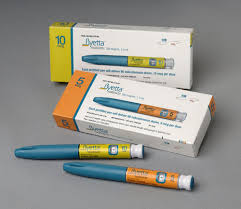Januvia & Byetta May Cause Thyroid Cancer
Januvia and Byetta have been promoted as safe and effective diabetes drugs, useful for both normalizing blood sugar levels and fighting obesity. However, doctors and researchers say there is cause for concern about the drugs beyond the known side effects the FDA warns about, such as renal impairment, hypoglycemia and Januvia pancreatitis. Preliminary evidence, including clinical trials and adverse event reports, show that Januvia and Byetta may be associated with an increased risk of thyroid cancer. Based on this evidence, watchdog groups like the Institute for Safe Medication Practices are calling for more research into the effects these medications have on human thyroid tissues along with stronger FDA warnings in the packaging and prescribing information of these drugs.
Thyroid cancer
The thyroid gland is located at the base of the neck, below the Adam’s apple. Thyroid cancer starts in the thyroid gland, but if left untreated my spread to other parts of the body. Because thyroid cancer is often found early and the thyroid gland can be safely removed, the long-term prognosis is generally good. However, the treatment itself has serious side effects, and after thyroid removal patients need to take replacement thyroid hormones for the rest of their lives.
Diagnosis of thyroid cancer
Thyroid cancer is sometimes diagnosed when a patient develops symptoms. The cancer may also be noticed by health care professionals during a routine physical examination. After a lump is observed, doctors may administer blood tests and/or imaging scans, such as an ultrasound examination, to find out more about the lump and the potential for involvement of other tissues. Ultimately, a biopsy may be taken in order to determine if the cells are cancerous.
Symptoms of thyroid cancer may include:
- lump in the neck
- neck pain
- ear pain
- difficulty swallowing
- trouble breathing
- wheezing
- hoarseness
- constant or frequent cough
- swelling in the neck
- swollen lymph nodes in the neck
Thyroid cancer treatment
Thyroid cancer is usually treated with surgery to remove the thyroid gland. During surgery, the surgeon may also remove any enlarged lymph nodes from the neck in case the enlargement is cancerous. This procedure is generally considered safe, but does carry some risks, such as infection, bleeding, and accidental damage to surrounding tissues, nerves, and glands. Following surgery, the patient will need to take pills every day, for life, to replace the hormones produced by the thyroid gland.
In addition to surgery, radioactive iodine may be administered in order to destroy any cancerous thyroid tissue remaining after surgery, including thyroid cancer that has spread to lymph nodes or certain other body parts. Some side effects of radioactive iodine include neck tenderness and swelling, dry eyes, dry mouth, nausea, vomiting, taste and smell changes, irregular periods in women, and lowered sperm count or infertility in men.
Rarely, thyroid cancer patients may have to undergo external radiation treatment and/or chemotherapy. These procedures have severe side effects and risks and are used as a last resort if the cancer spreads or fails to respond to regular thyroid cancer treatment options.
Januvia and thyroid cancer
The active ingredient in Januvia is sitagliptin, a drug that works by inhibiting an enzyme called DPP-4. Januvia is effective at treating diabetes because DPP-4 plays a role in regulating insulin and can lead to elevated blood sugar levels. However, Januvia could lead to thyroid cancer because DPP-4 also plays a role in fighting cancer. DPP-4 inhibition has already been linked to cancer of the skin, prostate, ovaries, brain cells, and lungs in animal studies, and a review of adverse event reports showed that patients taking Januvia reported incidence of thyroid cancer at a slightly increased rate. While the rate of thyroid cancer incidence in Januvia patients has not reached statistical significance in the short term, little is known about the long-term or cumulative effects of exposure and doctors and researchers urge caution until further research is done.
Byetta and thyroid cancer
The active ingredient in Byetta is exenatide, a chemical that activates GLP-1 receptors, which are responsible for insulin release and blood sugar control. Studies have shown that activation of GLP-1 receptors is also associated with higher cancer levels. Byetta and similar drugs have been linked to a particularly dangerous form of thyroid cancer, called C-cell cancer, in animal studies. C-cell thyroid cancer does not respond to radioactive iodine therapy and thus can be much harder to treat, especially if it spreads outside of the thyroid. Because C-cells may behave differently in humans than in rodents, researchers are calling for further investigation into the effects Byetta has on human thyroid tissues.
Analysis of adverse event reports suggests that thyroid cancer may occur between four and fifteen times as often in patients taking Byetta as it does in patients taking other diabetes medications.
Januvia and Byetta lawsuits
Merck, maker of Januvia, and Amylin Pharmaceuticals, Inc., Bristol-Myers Squibb, and Eli Lilly, makers of Byetta, have been named as defendants in hundreds of Januvia and Byetta lawsuits alleging that the drugs caused side effects like pancreatitis and pancreatic cancer and that the companies failed to adequately test the products and didn’t provide sufficient warnings to the public about their dangers.
At a hearing scheduled for July 25th, 2013, a federal judicial panel will consider consolidating these claims before a single judge for pretrial discovery, motions, and rulings. This procedure, called multidistrict litigation, is expected to encourage settlements, conserve resources, and ensure that people injured by Byetta or Januvia side effects get the compensation they deserve.
Resources
- Mayo Clinic - Thyroid Cancer http://www.mayoclinic.com/health/thyroid-cancer/DS00492
- American Cancer Society - Thyroid Cancer http://www.cancer.org/cancer/thyroidcancer/detailedguide/index
- Institute for Safe Medication Practices - QuarterWatch (April 2013 issue) Perspective on GLP-1 agents for diabetes http://www.ismp.org/Newsletters/acutecare/showarticle.asp?id=46
- Journal of Diabetes Research - A Review on the Association between Glucagon-Like Peptide-1 Receptor Agonists and Thyroid Cancer http://www.hindawi.com/journals/jdr/2012/924168/
- Indian Journal of Endocrinology and Metabolism - Prescribing gliptins: Enthusiasm should be coupled with caution http://www.ncbi.nlm.nih.gov/pmc/articles/PMC3313765/

